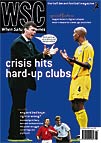 Football managed to soldier on without the devious involvement of television, and the Football League does not have to lie down and die when the money is taken away
Football managed to soldier on without the devious involvement of television, and the Football League does not have to lie down and die when the money is taken away
The Football League are getting all kinds of advice from the press about what to do in their dispute with ITV Digital, most of it accompanied by fingerwagging. The News of the World, for one, wonders why lower division clubs “think they have a right to such money in the first place” given that they have “wallowed in a swamp of debt for too long”.
The Sunday People, meanwhile, suggests that Sky could “rescue” ITV Digital by sharing coverage of the Football League in exchange for a share of the Champions League coverage. Yet it would be ludicrous, if not downright offensive, for Sky to pose as potential saviours of the lower divisions.
Sky’s attitude towards football is no different to that of Carlton and Granada, owners of ITV Digital, who seem quite prepared to see clubs go to the wall forthe sake of, as Millwall chairman Theo Paphitis put it, “saving a few bob for their shareholders”. In other words, they are more than happy to be associated with the game when the relationship is a profitable one, but their commitment is no deeper or more permanent than the local tyre firm sponsoring a Third Division club’s shirts. Probably less so, in fact.
The game wasn’t created by television, yet time and again it gives every impression of believing that to be the case. In this thinking, Year Zero came with the creation of the Premier League in 1992 when club chairmen, in collusion with the FA, offered football to Sky TV, and have since been hailed as “innovators” simply for signing a contract.
No one would suggest that the clubs should be above criticism for their predicament. Many have been spending the bulk of their income on wages, on the assumption that the television money would continue to flow in at the same rate for the foreseeable future. Clubs might try to blame players and their agents for the wage rises that have been secured across the board in every division, but they don’t have to pay what they’re asked for.
Nor has the leadership of the Football League been all that its members might have required, from the initial confusion over the guarantees demanded (or not demanded) of Granada and Carlton, to the Private Fraser-style doom-mongering of the League’s chairman Keith Harris (“anything between 30 to 50 clubs could be in a desperate financial situation”).
In fact, this affair need not have the dire consequences that have been forecast. Looked at objectively, the situation of the lower reaches has been considerably worse in the past. Attendances in the Third Division are at a 20-year high. Even before the current deal, money from TV, sponsors and public funds (in the shape of the Football Trust) had never been greater.
The only downsides are the uncertainty over transfer revenue in the wake of Bosman, and the inability of many clubs to control their wage bills. But the panic triggered off by ITV Digital’s problems, with chairmen such as Torquay’s Mike Bateson concocting “revolutionary” plans for regional leagues and forcible groundshares, is far worse than the reality.
And why, in any case, should football clubs be expected to be run at a profit? They never have done before, yet almost all have survived the perennial cries that 92 is far too many professional clubs for one country to sustain. Much has been made in the current crisis of the plight of clubs such as York and Bury. Yet those two, like most of the other clubs that have almost gone over the edge in recent years, have suffered more from the dubious activities of their “benefactors” than from a general revenue crisis. The League, with the FA, might pay more attention to enforcing the rules on financial propriety at their clubs, rather than crying wolf over ITV Digital money.
Some may also have enjoyed the fact that ITV Digital’s failure undermines one of the main planks in the argument put forward for a second tier of the Premier League. Clearly, there will never be enough people who want to watch live TV football below the top level, even if a competition was rebranded with a dynamic name like “Phoenix”. Indeed, some of the clubs who were at the forefront of that half-baked idea are now bleating loudest about their self-inflicted debt crisis.
But allowing for some culpability on the part of the clubs, there is no question that Carlton and Granada should be made to foot the bill for ITV Digital’s failure. The clubs should not accept whatever reduced offer is made to them.
It is true, as ITV Digital’s publicity suggests, that football is in a better position if it has more than one channel to choose from in any future negotiations. However, if the League allow themselves to be bullied into a shabby compromise on this one, their future negotiating credibility will be shot, regardless of how many offers are on the table.
From WSC 183 May 2002. What was happening this month